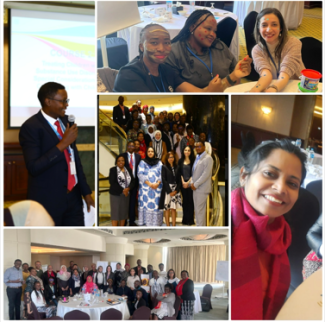Continental Training of Trainers (ToT) on the CHILD Curriculum and In-Person Training in Egypt

Children's drug use in Africa is a growing concern that requires urgent attention and comprehensive strategies. Understanding the complex factors influencing children's drug use and implementing effective prevention and intervention programs are crucial to addressing this issue.
To address the growing evidence of child substance use disorder and to support treatment interventionists in meeting the challenges, the Bureau for International Narcotics and Law Enforcement Affairs (INL) advanced a partnership with leading universities to implement and evaluate global child substance use disorder prevention and treatment protocols, with a longer-range intention of developing multiple child substance use disorder training teams. This resulted in the development of the Child Intervention for Living Drug-free (CHILD) Curriculum.
The CHILD Curriculum responds to this growing threat against an innocent population and represents a new focus of international drug demand reduction efforts. The six-course curriculum is a comprehensive resource that highlights special considerations when working with children with substance use disorders, counseling, and motivational interviewing, attachment theories and principles of treating children affected by trauma, pharmacological treatment of children with SUDs, and finally the Suitcase for Life Intervention Tool.
The Africa CHILD journey began on 14th November 2022, when the Drug Advisory Programme (DAP), Colombo Plan actualized the Virtual Training of Trainers (ToT) program and this culminated on 20th March 2022. However, due to the nature of the course content and the conducive environment to conduct in-person training, DAP organized an in-person training from 4th to 8th March 2024 in Cairo, Egypt. The CHILD Curriculum's screening and assessment tools for children with substance use disorders (SUDs) and the Suitcase for Life underscored the need for practical in-person sessions to apply theory.
This landmark training marked the first in-person training in Africa for practitioners working with children in the field of substance use prevention and treatment. It brought together participants from across Africa, providing them with valuable skills and knowledge to address children’s drug use in their respective countries.
During the opening session, Mr. Franklin Mwirichia, DAP Colombo Plan, emphasized the urgent need to help children using drugs in Africa. He highlighted the importance of trained professionals to address this growing problem and stressed the need for countries to undertake assessments and develop evidence-based programs. This was also an opportunity for the trainers to disseminate the recently developed Comprehensive Assessment of Risk, Resilience, and Experience (CARRE) Tool specifically developed for children with substance use disorders. The CARRE Tool is part of Course 7 of the CHILD Curriculum that is being piloted and under review.
The training was a lot of fun and incorporated practical sessions of the Suitcase for Life Course such as how to be a good friend and making healthy life choices. It was also a unique opportunity for participants to bring out the child in them through art, song, dance, and group/ individual exercises.
Some of the best practices and lessons learned from the training included:
- Intensive Outreach: Engaging in intensive outreach efforts to reach children already using drugs, including street-based outreach and targeted community interventions;
- Integrated Services: Providing integrated services that address the multiple needs of children using drugs, including mental health, education and vocational training;
- Peer Support Programs: Implementing peer support programs specifically designed for children using drugs, providing them with positive peer influences and a sense of belonging;
- Family and Caregivers Involvement: Involving families and caregivers in treatment and support programs, recognizing the crucial role they play in the recovery process;
- Cultural Sensitivity: Ensuring the programs are culturally sensitive and relevant to the communities they serve, taking into account local beliefs, practices, norms, and laws.
One thing everyone agreed on was the need to work together and the importance of practical, hands-on capacity-building of practitioners. To actualize this, a consensus was built to:
- Develop specialized training for professionals working with children already using drugs, focusing on evidence-based interventions and programs
- Develop tailored interventions that address the specific needs of children already using drugs, such as trauma-informed care and motivational interviewing
- Implement peer-led interventions that leverage the influence of peers to support behavior change among children using drugs
- Develop programs that support the reintegration of children using drugs into communities, including education and vocational training.
In conclusion, it is essential to adopt a holistic approach to addressing children's drug use in Africa. In addition, it is paramount for countries to deliberately build the capacity of practitioners in Africa to effectively address children's drug use. This includes providing ongoing training and support, as well as strengthening partnerships between governments, NGOs, and other stakeholders to implement comprehensive and sustainable interventions.
By leveraging the insights from the CHILD Curriculum and building on the momentum generated by the recent training in Egypt, we can work towards a future where children in Africa are protected from the harms of drug use and are given the support, they need to thrive.